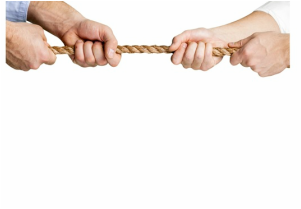|
Several years ago, my children (then 9 and 11) were listening to Katy Perry on the radio. As "Dark Horse" faded to black, the DJ announced that, after 14 months of marriage, Katy and her husband, Russell Brand, were divorcing. Apparently Russell had "grown bored" with Katy and wanted freedom to pursue other interests.
The following discussion ensued: Kid #2: Mom, how could Russell Brand get bored with Katy Perry? I think she is really interesting. Me: She does seem interesting. I guess, after a while, some people stop seeing what is interesting about their partners. Kid #1: That's weird. I have known my brother (Kid #2) my whole life. And he is NOT boring! Kid #2: And I have known my sister (Kid #1) my whole life and she is just full of surprises! Me: (silent and humbled) Like a taproot, this conversation lodged in my psyche. From it, sprang questions about how people come together and why they come apart. Most of us would say we choose people because of who they are. It is probably more accurate to say that, at least initially, we choose people because of our version of who we think they are. In the beginning of any relationship, this version is heavily informed by oxytocin (aka the "cuddle hormone"), which is responsible for the short-lived sensation of falling in love. Under its influence, we can't eat; we can't sleep; we dot the "i(s)" in our lover's name with little hearts. It's bunnies and rainbows all the time! Oxytocin is steadily released into the bloodstream for the first six months to two years of a relationship. Then it slowly tapers off. Through the lenses of this powerful chemical, everything about our partner and the relationship looks darned-near perfect. This is why so many of us make long-term plans based on feelings that, biochemically speaking, are meant to last the approximate duration of Katy Perry's marriage. As oxytocin leaves the bloodstream, our partner's imperfections gradually come into focus; so do our own. Around this time, it is both normal and expected for partners to experience a slight decline in relationship satisfaction (which can look a lot like boredom). Many folks, like Russell Brand, see this as a lighted exit sign. Relationship experts believe the real work begins when the honeymoon period ends. Falling in love is easy; staying there is another story. We are drawn into relationships by the fantasy that we will be loved unconditionally by another. A wiser (albeit unconscious) part of us knows that we must provide this for ourselves. We are biologically predisposed to do it, but our wounds get in the way. Intimate relationships are the crucibles in which these wounds--our psychic barriers to self-love--melt away. Every partner is an excavator, uncovering the places inside us that want to heal. Instead of viewing the pain of this process as a cue to listen closer to ourselves, we erroneously displaced it onto the person who exposed it: our loved one. The connective thread is compromised and we set off in search of someone different, someone who will not show us the places we are hurting. Each lesson ignored sets the stage for its sequel. This most commonly manifests in the repeated choice of a partner who will wound us in familiar ways (aka our "type"). For example, if early parental neglect or abuse stand in the way of self-love, we may continue to choose someone who is absent or critical to help us expose and remove this barrier. Every disappointed expectation in the present is an opportunity to grieve an unmet need from the past. Disappointment is our chance to offer the child inside us the love she or he deserved--love that was not freely given when it was most needed. When we practice unconditional self-love, over time, our wounds slowly begin to heal. How do we know this is happening? Single folks will notice traits that were once irresistible, now, are uninteresting. Our attraction directs itself toward individuals who help foster the love we have created. Those of us already in a relationship will feel "triggered" less often and, when conflict does arise, it is no longer a demand for our partners to change what they are doing (though, on occasion, that might need to happen), but as an invitation to set clearer boundaries and take better care of ourselves. When I am asked about the specifics of "how" to love more deeply, I remember Melody Beattie's words: "How stands for honesty, openness, and the willingness to try." This is a gentle reminder that we are not supposed to know all of the answers. It is enough to show up, speak the truth, and listen to our power of our own words. Despite our efforts, there may be times when the most loving thing we can do is leave a relationship. This is not failure. Some lessons are intended only for a season. Success is not determined by the duration of a relationship but by the space forged for our own love to thrive. Dr. Jill Gross is a licensed psychologist, therapist, and counselor. She offers grief therapy, divorce support, and other counseling services in the Phinney Greenwood area of Seattle, WA. Need help finding your path to greater self-love? Schedule a free consultation to see how therapy or counseling can help you!
2 Comments
Growing up, my sister and I fought a lot. I'm sure we drove our parents crazy, bickering about one perceived slight or another--who stole the purple Barbie Corvette, whose turn it was to sit in the front seat--really important stuff like that.
When frazzled adults attempted to intervene, we would immediately attempt to soften the blow of justice by casting ourselves in the role of victim. "She started it!" or "It was all her fault!" These battle cries did little to exonerate us. More frequently, they got us both into more trouble. I am now a mother and witness to my children's whodunnit capers. At twelve and fourteen, when they disagree, it is imperative my children determine whose fault it is or who started it. Back and forth they lob the blame, desperate to "win," until they tire or I go all "Scary Mommy" on them, whichever comes first (hint: it's usually the latter). Thirty-five years later, my children picked up the argument right where my sister and I left it. With underdeveloped egos, children play the blame game because they don't know any better. For them, a complex world is made simpler when viewed through lenses of right and wrong. Why then, in conflict, do adult family members, lovers, or friends (who know better) dissolve into enemies over seemingly trivial things? The answer is both simple and complex. Conflict exposes our unmet needs for love, acceptance, or acknowledgement. The more intense the conflict, the deeper the unmet need. Acute awareness of this hunger makes us feel ashamed. We attack others so they won't notice how vulnerable we are. Acknowledgement and understanding open our channels for love; self-righteousness closes them. Dividing arguments into factions of winners and losers is a betrayal of our hunger. Every time we point our finger away from ourselves, we are unconsciously telling love where to go. If it is love we crave the most, when we are wounded, we must be brave enough to step off the mat, first toward ourselves, then toward each other. While there is no prescriptive formula for this, here are a few things to consider: 1. Know when you are triggered and take care of yourself. "The red zone" (increased heart rate, blood pressure, unclear thinking, etc.) is your body's way of signaling you to stop and pay attention to your own unmet needs. When you start to feel overwhelmed, tell the person with whom you are in conflict that you need to take a quick break to settle yourself. Twenty minutes is usually enough time to reduce cortisol (aka stress hormone) levels and restore clear thinking. When you are calm, ask yourself what you really want. 2. Consider both sides. Compassion inches us toward connection. Like you, the human with whom you are arguing is also lugging around a suitcase full of his or her own unmet needs. You already know your side of the story. Practice arguing his or hers: how might s/he feel? What might s/he want? Exploring another's perspective does not mean we agree with it. It simply means we are open to considering someone else's point of view. Sometimes, feeling heard is enough to convince both parties to drop the rope. 3. Depersonalize outcomes. Ask respectfully for what you want. This does not mean that you will get it. Rarely is this personal. Remember: all disappointment is an invitation to attend to our own hunger. Offer yourself the love you seek from another. 4. This too is temporary. This "thing" that seems so important right now? It will eventually pass. Every feeling we have is designed to last approximately 60-90 seconds. That's it! 5. Set an intention for change and give it time. Like a scab, anxiety can tempt us to pick at a situation that would otherwise heal nicely on its own. Not knowing what to do right now could mean that both time and nature need to work their magic. Set this down for a while. You can always come back to it later. All you need to know right now is that you are open to resolution. 6. You're in this together. All relationships are co-created. You alone are not responsible for fixing any relationship. Resolution requires participation from both parties. There is no shame in hunger. Wrap your arms around whatever it is you yearn for. When we hold ourselves accountable for our own unmet needs, conflict does not divide us. It helps us find each other! Dr. Jill Gross is a licensed psychologist, therapist, and counselor. She offers grief therapy, divorce support, and other counseling services in the Phinney Greenwood area of Seattle, WA. Is your relationship being torn apart by conflict? Schedule a free consultation to find out how therapy or counseling can help put things back together. |
AuthorDr. Jill Gross is a licensed psychologist, specializing in grief and divorce. Her coaching and therapy practice is located in the Phinney - Greenwood area of North Seattle in Washington. Archives
May 2021
Categories
All
|
HoursM-TH: 8:30 AM - 2:00 PM.
By Appointment Only |
Telephone & Email |
Address503 N. 50th Street
Seattle, WA 98103 |
*Header Photographs courtesy of Josh Martin




